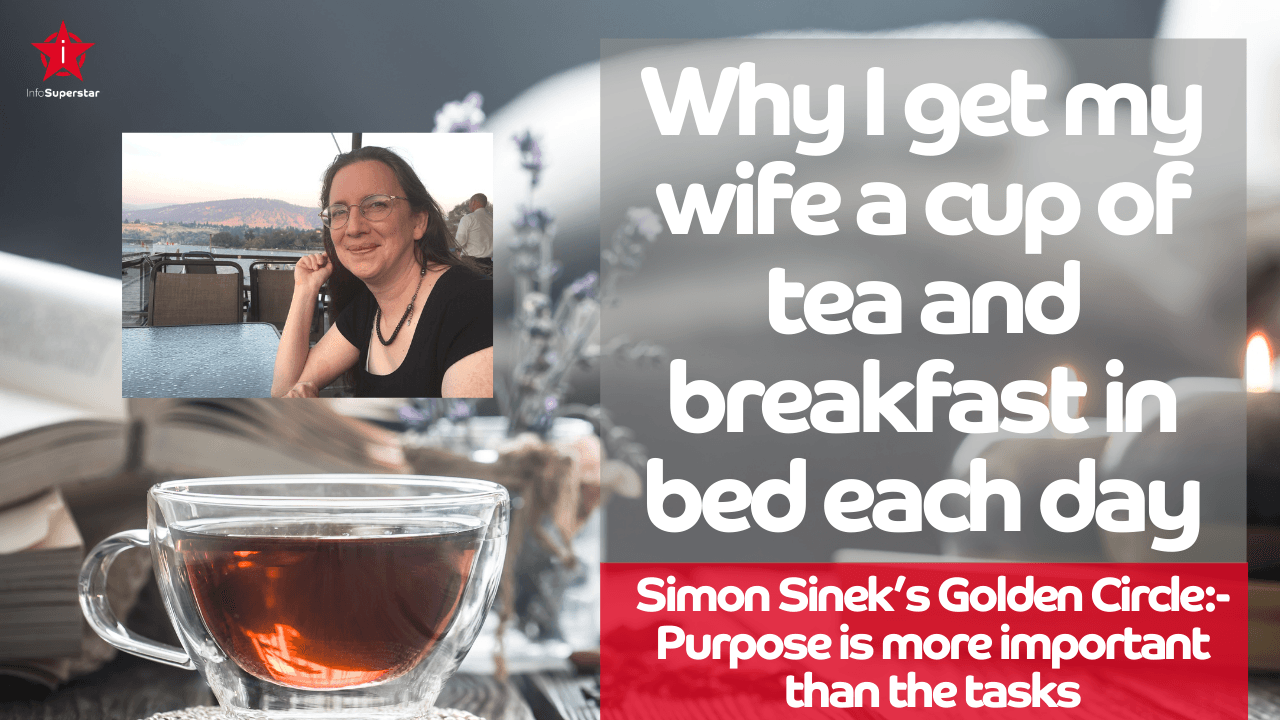Why I get my wife a cup of tea and breakfast in bed each day
Simon Sinek’s Golden Circle: Purpose is more important than the tasks
Last week I talked (literally on a podcast!) about what got me up in the morning.
I’d love you to listen if you haven’t already done so ( link here
), but (Spoilers!) I started off by noting that the first thing I did in the morning was to get my wife a cup of tea and breakfast in bed.
In this instance I run the morning catering service because I love my wife and cherishing her needs to be a conscious focus.
I’m sure there are times in my life when, distracted by the demands of a busy professional career and my hobbies, I did a less than perfect job of cherishing the woman I made a promise to over 30 years ago.
But four years ago ( I wrote about his here)
I set out my personal plans to ensure that I put family relationships into my plan, in balance with all the work and non-work demands that I choose to take on.
In this instance, I don’t have to consult my ‘to-do’ list to grab the teabags because I’ve built a habit, based upon how I see my purpose in life. I made a conscious effort to build subconscious routines that allow me to ‘do the right thing’ in line with the vision I had written down. And since my wife’s love-language includes being given tea to help her wake up, that’s one task that fits my purpose as her husband.
Later in the podcast, I talked about a more fundamental issue than “What” the first task I do when I get up.
'Why I do it' is much more important than the task I do
Sometime after writing down my three-year vision and personal objectives, I read the book “Start with Why” by Simon Sinek, which I recommended on the above podcast.
According to Sinek what I had chosen to do in my personal plan has some backing in neuroscience.
More importantly, what works at a personal level also works for organisations.
Organisations that have a clear sense of purpose i.e. they understand ‘Why’ they are doing what they do end up being more successful.
If you think about it, that makes sense.
Increasingly, people want to consume products and services from companies that they trust – which means they have some sense of the values of that enterprise.
Employees don’t just want a monthly salary – they want to be proud of the organisation they work for.
If everyone in your organisation is constantly aware of the persuasive reason behind where the organisation is trying to get to, then every decision they make and task they execute is more likely to be useful and strategically positive.
You’ll waste less time, minimise office politics and release the creative potential of your staff.
The book talks about the “Golden Circle” principle, where a sense of purpose (“Why”) is the core of any ‘planning’ or ‘doing’ process.
Does that matter if my company is only making ‘widgets’
or money for shareholders?
Simon Sinek thinks it does.
Rather than write out a long explanation, l I found this neat, two-minute video that explains this concept.
Whilst people do want to get up each morning and have an opportunity to earn the money they need to eat and put a roof over their heads, they’d much rather do that while also doing something that they feel is making a meaningful contribution to the world. Organisations with clear purpose tend to be more attractive – they recruit and retain better employees.
I know this to be true from my own career history. When, in 2013, I took on a role at Traidcraft , the Fair Trade pioneer, it was because I shared many of the beliefs about trade justice that they had. ‘What’ they sold was secondary - although the yummy Fair Trade chocolate and coffee were a bonus!
Back to your response and reflecting upon my personal tea-making
Without dropping into a full-blown existential crisis, why don’t you take ten minutes out of your day to write down “Why” you’re doing what you’re doing in life?
Do it firstly for yourself.
The answers may just reaffirm what you’re doing and give you affirmation that whilst it’s tough out there right now, you’re doing the right things. e.g. “I’m working hard to stick at this job because it earns the money my family needs. I believe I have something unique to offer in my job etc….”
Or it might be that there are changes you want to make because you remind yourself that you have a purpose. “I realise that I’ve been focusing too much on my work and I need to let my partner know I love them by regularly doing something that speaks in their love language”
Even if you only end up making someone a cup of tea, you’ll have made the world a better place…
Then do it for your organisation, as if you are the CEO (although you might be the CEO!)
If that’s easy – great. But if it’s not clear, then maybe, you can start talking to others in your organisation (or department) so you can gather a clearer sense of ‘why’ you do what you do, as a foundation to becoming an Information Superstar.
Let me know if you made a big breakthough!
Or let me know if you’re in any way struggling to get to grips with this task. Maybe I could help?
Until next time – adios amigos!
Andy Biggs
INFOSUPERSTAR IS THE TRADING NAME OF REFLECT BUSINESS SOLUTIONS LTD, 47 WEARSIDE DRIVE, DURHAM, DH1 1LE UK | COMPANY REG No (ENGLAND AND WALES): 8672028











